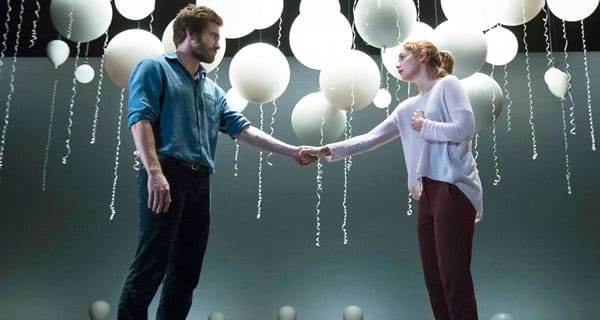
Constellations
The Samuel J. Friedman Theatre
15 January 2015
5 Stars
Let’s start with the balloons. There are many of them suspended over the shiny obsidian floor on which there is a rectangular platform, also shiny and black. This is Tom Scutt’s set for Nick Payne’s extraordinary play, Constellations, now playing at the Samuel J Friedman Theatre on Broadway in the Royal Court’s production directed by Michael Longhurst.
They are mostly white, or perhaps off-white, balloons. Lots of them. So why?
As the play progresses, there is a reference to a situation where a patient who was dying was surrounded by balloons, so that must be a clear reference point. When that moment comes, it provides a sort of backwards Euerka! moment. And in one way the ballons from then on symbolise the ever present possibility of death.
But, it’s not just that. In a simplistic way, balloons start out as flat, two dimensional objects. Only when they are inflated, again simplistically, do they become three dimensional. And each balloon, when inflated, is not exactly the same as any other unless the amount of air inside it is precisely the same as another. You can look at these balloons and think they are the same, but they are intrinsically different.
So Scutt’s set provides a visual representation of the scientific principles that Payne seeks to examine and explain in Constellations. The central conceit depends upon the theory that every moment that one has chosen in which to do something, as well as every moment where no choice has been made or a decision not to do something is taken, exists concurrently in a set of parallel universes: a multiverse of infinite variety.
So just as chaos theory underpins Stoppard’s masterpiece, Arcadia, so the multiverse theory underpins Payne’s Constellations. But you don’t need to understand the theory before you see play in order to enjoy it, because Payne’s writing is delicate, awash with honesty and heart and proves to be a captivating and thrilling theatrical experience.
It is unlikely that you will have ever seen a play quite like this. It is dazzling in absolutely every way.
The cast of two charts the multiverse possible relationships of two people, Roland and Marianne. We see them meet, date, get together, cheat on each other, separate, reacquaint, get married and then face mortality head on. While these are the elements of the story, each element is covered multiple times and in multiple ways, as the myriad of possibilities that the multiverse offers are examined.
So the actors repeat much the same lines scene after scene, but with different emphasis or intent, or as slightly different versions of the same characters. This could, fairly obviously, become tiresome and repetitive. But not in Longhurst’s magnificent production.
The acting is of the highest order. Every word, every pause, every gesture – all is precisely calibrated and thoughtfully designed to ensure maximum interest, a real involvement in the many disparate lives of these two intriguing characters. Once the foundations are set in the early scenes, Payne’s work is free to explore the many ways this relationship could play out, all of which could lead to the final end point, or at least one of them.
Along the way, there are very funny scenes, scenes full of misunderstanding and anger, scenes of aching honesty and brutal realism – a tapestry of experiences that together present a rich and complex sense of intertwined lives.
Jake Gyllenhaal proves to be entirely perfect as the ordinary bee-keeper, Roland. His English accent is perfect as is his sense of the ordinariness of this gentle, loving man who comes to adore – and need – Marianne. Every version of every repeated scene is different in Gyllenhaal’s hands and he astutely permits the audience to follow the shimmering changes in each version of his life we see.
He conveys awkwardness as convincingly as he permits understanding of pent-up frustration and the deep truth of his love. It’s a marvellous, technically astonishing performance – riveting and heartbreaking in equal measure.
Ruth Wilson is equally wonderful and technically agile as the quirky scientist who becomes the love of Roland’s life. Wilson brings a saucy humour to the piece which is welcome, especially as it slices away at the sober facade of Gyllenhaal’s blokey Roland. She is very very funny, but also fragile and stern and unfair – whatever the situation requires, Wilson provides.
And sometimes the choices are unexpected, and all the more rewarding for that. Particularly impressive was the way both actors handled the several scenes where Roland proposes to Marianne – the range on show in this handful of scenes was truly breath-taking and it would be the hardest of hearts that did not melt at some point during that sequence.
Some aspects of the play are very bleak, but both Gyllenhaal and Wilson ensure that the humanity and realism of their characters lessens the edge of that bleakness. It is simply wonderful to see such gifted, creative and resonant performances.
Everything about the production sings. Lee Curran’s lighting design is immaculate and adds to the sense of the multiverse experience expertly. Simon Slater’s music is haunting and drives along the pulse of the drama.
Who knew a play so rooted in scientific principles and which confronts the pointy end of death’s embrace with such raw and incisive candour could also be joyful and utterly life-affirming? Nick Payne. Who, for my money has, with Constellations, out-Stopparded Stoppard himself. Quite an achievement.
A perfect piece of theatrical ingenuity. Spellbinding.
